News
The faculty members of the American Studies program are saddened to note the passing of their long-time colleague, Jerry Cohen -- but we are grateful to have had the honor of knowing him, working with him, and learning from him. We share the following obituary with all of our students, past and present, and we will keep you posted about plans to have a memorial for Jerry in the spring, near what would have been his 90th birthday. A remembrance of Jerry, written by our colleague, Steve Whitfield, has also been published here.
Professor Cohen's Obituary
Jacob (Jerry) Cohen, 89, beloved husband, father, grandfather, teacher, writer, and civil rights activist, died at his home in Waban, MA on October 22. Jerry taught American Studies at Brandeis University for over fifty years. His class on “The Sixties” was listed as the best course in Brandeis University in Lisa Birnbach’s College Book (1984). He is said to have taught more students than any other professor in the history of the college.
Jerry was born on March 22, 1934, in Newark, New Jersey, and grew up in nearby Somerville. From his father (a hardware store owner and part-time cantor) he inherited his love of opera and a deep sensitivity to the complexities of Jewish identity in America. After graduating from Rutgers University in the mid-1950s, he went on to earn an MA at Yale University before moving to Massachusetts in 1960 to teach history at Brandeis. Between 1964 and 1968, Jerry took a leave of absence to serve on the staff of CORE, working closely with its co-founder, James Farmer, during one of the most turbulent periods of the civil rights era. He also co-edited a magazine with novelist and cultural critic Albert Murray. Returning to Brandeis in the late 1960s, Jerry joined the American Studies Department where he continued teaching until his retirement in 2017. In 1968, he spearheaded the Myra Kraft Transitional Year Program (TYP) to assist students from disadvantaged backgrounds. He also wrote a faculty report that prompted the university to divest its holdings in South Africa.
Much of his scholarship focused on the idea of conspiracy in American culture. He wrote prolifically on the Kennedy Assassination, and his critique in Commentary of Oliver Stone’s film JFK was reprinted in Best American Essays of 1993.
A gifted lyric tenor, Jerry sang the Kol Nidrei prayer at Brandeis Yom Kippur services for many years. His marriage to Russian-American pianist Helena Vesterman (his third wife) opened the door to a flourishing musical life that embraced arias, art songs, spirituals, and cantorial prayers. In 1998, he performed in a concert of Russian music at Weill Auditorium in Carnegie Hall.
Jerry was a man of volatile passions and immense generosity. As one of his sons recalled, “He lived his life as if it were an opera in which he had been assigned the tenor role.” As his health declined his wife, Helena, arranged for him to live at home under the supervision of caregiver Angela Lukyamuzi, who became his last great friend. Two nights before his death, they could be heard singing spirituals together in the Inpatient Ward of Brigham and Women’s Hospital. He was buried in the Baker Street Jewish Cemetery in West Roxbury. He is survived by his wife; his brother, Marshall Cohen; his sons Joshua, Benjamin, and Casey; four stepsons; seventeen grandchildren; and three great-grandchildren. A memorial service at Brandeis is planned for spring 2024.
Anna Birtwell Badalament, winner of the Pauli Murray Award and the Justice Louis D. Brandeis Internship Research Prize.
Jessica Ashley Cocomazzi, winner of the Justice Louis D. Brandeis Essay Prize.
Adina Sarah Kalish Scheinberg, high honors and winner of the Lawrence Fuchs Award.
Seth Isaac Wulf, high honors.
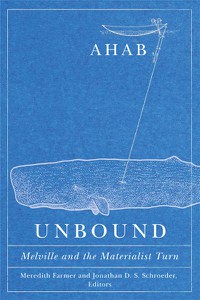 "Ahab Unbound: Melville and the Materialist Turn"
"Ahab Unbound: Melville and the Materialist Turn"
2022: Meredith Farmer and Jonathan D. S. Schroeder, Editors
Afterword by Samuel Otter
"Ahab Unbound" advances an urgent inquiry into Melville's emergence as a center of gravity for materialist work, reframing his infamous whaling captain in terms of conversations in animal studies, critical race and ethnic studies, disability studies, environmental humanities, medical humanities, political theory and posthumanism. It makes a case for the vitality of materialist inquiry and the continued resonance of Melville’s work.
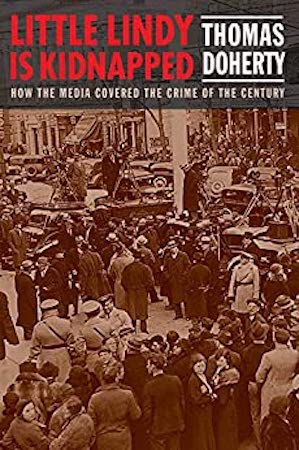
Much has been written about the kidnapping and murder of Charles Lindbergh, Jr., the subsequent investigation, and the trial and conviction of Bruno Richard Hauptmann, but Prof. Thomas Doherty's new book, "Little Lindy Is Kidnapped: How the Media Covered the Crime of the Century" takes on a new angle.
As Dohorty says: "I found most of the books about the case are sort of true crime accounts about what happened during the kidnapping, the trial, whether Hauptmann was guilty or not guilty, those kinds of questions. Nobody had done a book exclusively on the media revolution."
Paula Jo Musegades' "Aaron Copland's Hollywood Film Scores" is a pioneering study of how the famous American composer helped to shape the sound of Hollywood movies and the place of sound in American films.
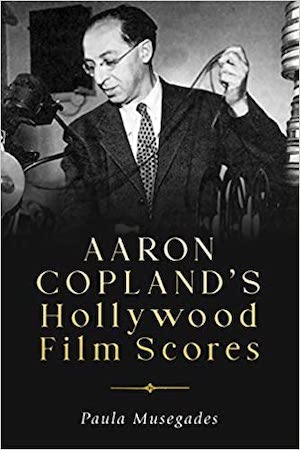
Jerome Tharaud's "Apocalyptic Geographies: Religion, Media, and the American Landscape" examines how white evangelical Protestants in the antebellum United States used print culture to shape Americans' understanding of a wide variety of secular and sacred issues.
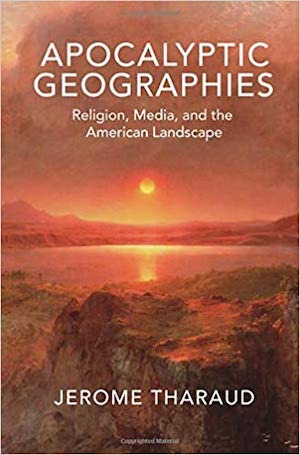
The American Studies program is delighted to announce that Lydia Emmanouilidou, class of 2014, was recently made the Athens Bureau Chief for Public Radio International Program's The World. While at Brandeis, Lydia completed a senior honors thesis in American Studies that explored the American news media's coverage of the Monica Lewinsky scandal. She received the distinction of "highest honors" for that project.
Lydia also minored in Journalism, and after graduating from Brandeis, she accepted a fellowship at National Public Radio, before going on to work as a producer for WGBH's Morning Edition. She later worked as a reporter for 'GBH's Education Desk before going on to work for The World.
You can hear Lydia's latest report from Greece here.
David Aizenberg: Harry, Joseph and Ida Stein Memorial Award
To the outstanding male student-athlete. Aizenberg also earned All-American honors this year, Brandeis's first All-American since 1994.
Justice Louis D. Brandeis Essay Prize: Jessica Lauren Gedallovich
Michael Kalafatas ’65 Admissions Prize: Kalianni Neal-Desatnik
To an outstanding Brandeis senior who has greatly contributed to the admissions process throughout his/her/their time at the University.
Richard Kaufman ‘58 Memorial Prize: Rachel Wang
Student/s who demonstrates leadership in campus activities and who, through academic achievement, exemplifies the well-rounded student who is likely to have a lifelong interest in his/her/their fellows.
Doris Brewer Cohen Award in Justice and Public Life, Lawrence Fuchs Award, Lester Martin Foundation Award in Legal Studies: Donald Gerard Weisse III
Pauli Murray Award: Natalia M. Wiater
January 9, 2019
Dan Breen gave a talk, "Stories of Privacy: The Legal Boundaries of Public and Private Life," to the Tucson, Arizona, chapter of the Brandeis National Committee. His lecture was part of the BNC's University on Wheels program and was co-sponsored by the Tucson Jewish Community Center, which hosted the event.
Lawrence Fuchs Award: Kaitlyn Xiaorong Decker-Jacoby
Pauli Murray Award: Julianna Eleanore Scionti
November 11, 2018
"Stan Lee is one of those people that helped the field of American Studies look at bizarre material — he made comics and comic art worthy of critical intelligence," Thomas Doherty says.
October 22, 2018
Stephen Whitfield previews "The Power of Music" exhibition at Brandeis.
October 9, 2018
In Tablet article, Thomas Doherty examines how the architect of the Final Solution, an otherwise unremarkable bureaucrat, became a star character for film.
Justice Louis D. Brandeis Essay Prize: Valerie Achille
Michael Kalafatas '65 Admissions Prize and Pauli Murray Citizen-Scholar Award in American Studies: Ruaidhri Thomas Belfry Crofton
Lawrence Fuchs Citizen-Scholar Award in American Studies: Abigail M. Patkin
September 24, 2018
Lee Bloch has joined the university as the Florence Levy Kay Fellow in Native American and Indigenous Studies for 2018-20, and will serve as a lecturer in the departments of anthropology and American studies.
Bloch, who holds a PhD in anthropology from the University of Virginia, is working on his first book, "Sweetgum Archaeology: Mound Landscapes and the Unfinished Histories of the Native South." The book draws on community-based research with members of a small Native American community in the U.S. South who identify as of Muskogee (Creek) ancestry, focusing on indigenous knowledges about large-scale earthworks built by ancient peoples over the last 5,000 years.
April 13, 2018
A Washington Post review of Thomas Doherty's illuminating new book "Show Trial."
April 13, 2018
A Washington Post review of Eileen McNamara's new book on "the Kennedy who changed the world."
March 7, 2018
Joyce Antler writes about her forthcoming book on Jewish radical feminism.
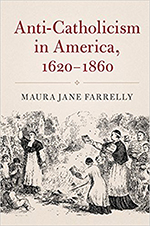
January 23, 2018
From The Junto blog on American history: "Whether John Higham was correct in describing anti-Catholicism as the 'most luxuriant, tenacious tradition of paranoiac agitation in American history' is a matter of debate. Not as disputed, though, is the reality that, until relatively recently, a great many Americans did view Catholicism as one of the principal threats to liberty and order in the United States. Maura Jane Farrelly’s masterful new volume, 'Anti-Catholicism in America, 1620-1860,' traces the development of anti-Catholicism in the United States (or what would eventually become that country) from the establishment of Plymouth Colony to the coming of the Civil War."
Herbert Fisher Award for Exceptional Achievement in American Studies: Leah Margalit Newman and Jessica Robin Shinberg
July 18, 2017
Thomas Doherty wonders if today’s atmosphere on college campuses encourages, or even tolerates, the kind of unsparing reprimand from a professor that might be needed for a student’s growth.
December 2, 2016
Brian Donahue has been made an elected member of the American Antiquarian Society, a national research library of American history and culture through 1876.
Carrie (’83) and Gail (’88) Fisher Award in American Studies: Ellie Marie Driscoll, Sarah Anne Lemelman, Kaitlyn Julia Sever, and Zoe Joelle Waldman

Civil rights activist and Richman Fellow Julian Bond speaks in Rapaporte Treasure Hall on campus.
April 6, 2015
Julian Bond went into the segregated cafeteria of Atlanta’s city hall with a group of fellow college students in 1960 and when he was refused service, he refused to leave. It was the first time he was arrested and brought before a judge.
"After some back and forth, the judge asked me, 'How do you plead?' And I was panic-stricken," Bond recalled. "On the one hand, I knew I was guilty — a policeman had asked me to leave and I had refused. But I didn't feel guilty — I knew I had a right to eat in that tax supported cafeteria, and that any law that said I couldn't was no law at all."
The civil rights leader received a standing ovation upon being recognized as the 2014-15 Richman Fellow in a ceremony and speech March 31 at Rapaporte Treasure Hall.
January 2, 2015
In an interview with WGBH, Thomas Doherty discusses Hollywood mogul Louis B. Mayer's transformation from a "struggling scrap metal dealer" to a major player in the Hollywood industry.
November 21, 2014
In an article in the Boston Globe, Brian Donahue discusses his "elaborate report laying out a scenario in which New England, in the year 2060, has three times as much farmland as it does now — a full 6 million acres, or 15% of the entire landmass, upon which to raise crops and livestock that would be consumed by the local population. Under these conditions, the authors of the report argue, New England could grow 50% of its own food."
October 20, 2014
In an interview with the Boston Globe, Brian Donahue discusses "A New England Food Vision," a collaborative report that asserts Massachusetts should be growing half of its own food by 2060.
December 18, 2013
It is a with deep regret that we in the American Studies Program at Brandeis University have decided to discontinue our institutional affiliation with the American Studies Association. We view the vote by the membership to affirm an academic boycott of Israel as a politicization of the discipline and a rebuke to the kind of open inquiry that a scholarly association should foster. We remain committed to the discipline of American studies, but we can no longer support an organization that has rejected two of the core principles of American culture: freedom of association and expression.